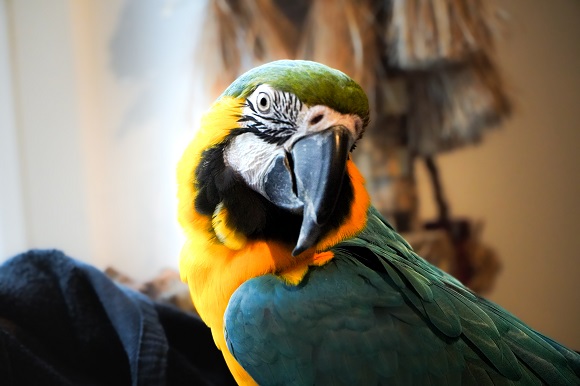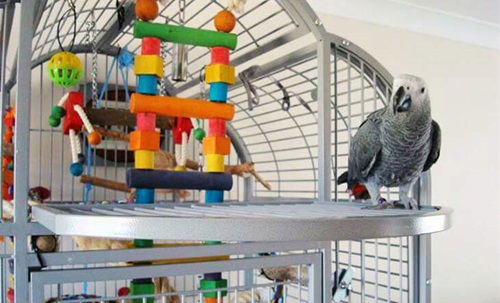
Building trust with your parrot is essential for a healthy and happy relationship. Parrots are intelligent, sensitive creatures that require patience and consistency to develop a strong bond with their human companions. This guide will walk you through the steps to build and maintain trust with your parrot, ensuring a rewarding and enriching experience for both of you.
Understanding the Importance of Trust
Trust is the foundation of any successful relationship, and this is especially true for parrots. A trusting parrot is more likely to be affectionate, less prone to behavioral problems, and easier to handle. Establishing trust takes time and effort, but the rewards are well worth it. A parrot that trusts you will be more comfortable and happy in their environment, leading to a more harmonious household.
Trust is crucial for your parrot’s mental and physical well-being. A lack of trust can lead to stress, fear, and aggressive behavior. Understanding your parrot’s needs and consistently meeting them helps to build a strong, trusting bond that enhances your parrot’s overall quality of life. When your parrot feels safe and secure, they are more likely to engage positively with you and their surroundings.
Creating a Safe and Comfortable Environment
Ensure your parrot’s living space is safe, comfortable, and free from potential stressors. A well-maintained bird cage with appropriate perches, toys, and hiding spots will help your parrot feel secure. Regularly clean the cage and provide fresh food and water to keep your parrot healthy and happy.
A secure living environment is the first step in building trust. Your parrot needs to feel safe in their space to start developing a bond with you. Pay attention to the placement of the cage; avoid areas with excessive noise or sudden movements that could frighten your parrot. A clean and well-equipped cage not only keeps your parrot physically healthy but also contributes to their mental well-being by providing a comfortable and stimulating environment.
Parrots thrive on routine. Establish a consistent daily schedule for feeding, cleaning, and interaction. Predictability helps your parrot feel secure and reduces anxiety, making them more open to bonding with you.
Consistency in their daily routine helps your parrot understand what to expect and when to expect it. This predictability reduces stress and makes your parrot feel more secure, laying the groundwork for trust-building. A consistent routine also helps in establishing a communication pattern between you and your parrot. When your parrot knows that their needs will be met regularly, they are more likely to trust and rely on you.

Positive Interaction and Socialization
Always approach your parrot calmly and gently. Sudden movements or loud noises can scare them and set back your trust-building efforts. Speak softly and move slowly when interacting with your parrot.
A gentle approach is crucial for making your parrot feel safe and comfortable. Parrots are sensitive to their owner’s demeanor, so maintaining a calm and gentle presence helps them feel secure. Consistent, gentle interactions build a foundation of trust over time. Remember to always respect your parrot’s space and avoid any actions that might be perceived as threatening.
Hand-feeding your parrot and offering treats can significantly strengthen your bond. Start by offering treats through the bird cage bars and gradually progress to hand-feeding inside the parrot cage. This positive reinforcement helps your parrot associate your presence with good things.
Hand-feeding is a powerful tool in building trust. It encourages your parrot to come closer to you and associate your hand with positive experiences. Use their favorite treats to make the interaction even more rewarding. Over time, your parrot will become more comfortable and trusting of your presence. This process also helps in reducing fear and anxiety related to human hands.
Respect your parrot’s personal space and avoid forcing interactions. Allow your parrot to come to you at their own pace. Pushing your parrot too quickly can result in fear and mistrust. Patience is key.
Respecting your parrot’s space is essential for trust-building. Allowing them to initiate contact shows that you respect their boundaries and are not a threat. Over time, this respect will help your parrot feel more comfortable and willing to interact with you. Giving your parrot the choice to engage helps in building a positive and trusting relationship.
Building Trust Through Play and Training
Engage in interactive play with your parrot using toys and games. This not only provides mental stimulation but also strengthens your bond. Experiment with different toys to find out what your parrot enjoys the most.
Interactive play is an excellent way to build trust. It provides mental stimulation and allows your parrot to associate you with fun and positive experiences. Regular play sessions help reinforce your bond and build mutual trust. Playing with your parrot helps in understanding their preferences and behaviors, leading to a stronger and more affectionate relationship.
Training your parrot using positive reinforcement techniques can enhance your bond and build trust. Teach your parrot simple commands and tricks, rewarding them with treats and praise for their efforts.
Positive reinforcement training is effective for building trust and teaching your parrot new behaviors. Rewarding your parrot for desired behaviors encourages them to repeat those behaviors and strengthens your bond. Training sessions should be short, consistent, and always end on a positive note. This method not only helps in managing your parrot’s behavior but also provides an opportunity for positive interaction and communication.
Addressing Fear and Building Confidence
Identify potential stressors in your parrot’s environment and work to minimize them. Common stressors include loud noises, sudden movements, and unfamiliar people or pets. Reducing these stressors helps create a more peaceful environment conducive to trust-building.
Understanding and reducing stressors is critical for building trust. By creating a calm and safe environment, you help your parrot feel more secure and open to bonding with you. Pay attention to your parrot’s body language to identify what makes them uncomfortable. Removing or reducing these stressors can significantly improve your parrot’s confidence and willingness to engage with you.
Gradually introduce your parrot to new experiences and environments to build their confidence. Start with small, positive experiences and gradually increase the complexity. Reward your parrot for handling new situations well.
Gradual exposure to new experiences helps build your parrot’s confidence and reduces fear. Introducing new things slowly and positively ensures that your parrot feels safe and supported. This process helps your parrot become more adaptable and trusting. Consistently rewarding your parrot for brave behavior in new situations reinforces their confidence and trust in you.
Conclusion
Building trust with your parrot requires time, patience, and consistent effort. By creating a safe environment, engaging in positive interactions, and using gentle training techniques, you can develop a strong, trusting bond with your feathered friend. With dedication and the right approach, you can enjoy a fulfilling and harmonious relationship with your parrot.
Investing time and effort into building trust with your parrot will lead to a happier and healthier relationship. A trusting parrot is more likely to be affectionate, less prone to behavioral problems, and easier to handle. By following these steps, you can create a strong, lasting bond with your parrot, enriching both your lives. Building trust is a continuous process that enhances your parrot’s quality of life and your experience as a parrot owner.
